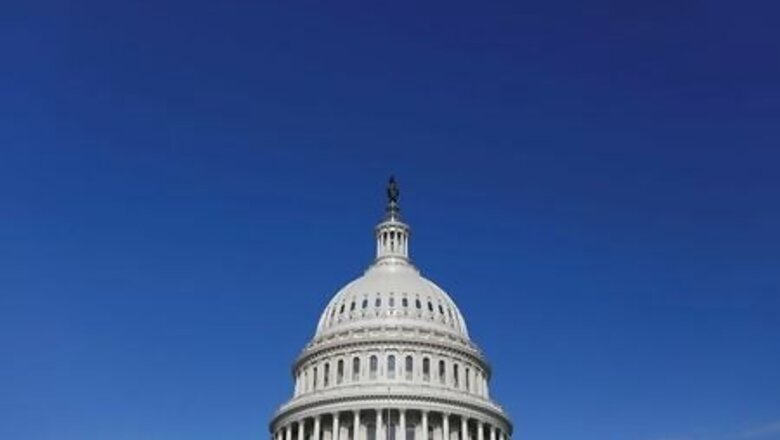
views
WASHINGTON: Even if Joe Biden wins the U.S. presidential election and his fellow Democrats gain full control of Congress, his ability to secure passage of an ambitious legislative agenda may be limited by a stubborn Washington reality: the high hurdle for getting things done in the Senate.
A longstanding Senate rule requires 60 votes in the 100-seat chamber in most instances to take up and hold votes on bills. If Democrats in the Nov. 3 election win the White House, maintain control of the House of Representatives and amass a Senate majority comparable to that currently held by President Donald Trump’s fellow Republicans, Biden’s party still would be limited in what they could get through Congress.
Any bill would need to attract at least some Republican support in the Senate, a chamber beset by partisanship. Congressional aides, party strategists and political analysts said that could be a recipe for continued gridlock.
Democrats have promised dramatic change should they take power in Washington including steps to make healthcare more affordable, combat climate change, protect voting rights, reform racial inequities in the criminal justice system and address crumbling U.S. infrastructure.
Republicans, who hold 53 seats in the chamber, are sounding dire warnings about a liberal insurgency as they raise money to defend their Senate majority even as Trump works to defeat Biden.
Senator Debbie Stabenow, who chairs the Senate Democratic Policy and Communications Committee, said the first priority of a Democratic-led Congress would be to work with Biden to craft a plan to combat the coronavirus pandemic, assist people and small businesses hit by the public health crisis and rebuild the economy through infrastructure spending and other job-creating initiatives.
“We have to get our arms around this pandemic,” the Michigan Democrat told Reuters.
“That has to be No. 1. And then right with it is the continued impact on families and small businesses. And then we’re going to focus on how to ‘build back better,’” Stabenow said, using a Biden campaign slogan.
Democrats see an opening toward gaining a Senate majority. At least seven Republican incumbents face highly competitive challenges in states including Arizona and Colorado. But even optimistic forecasts do not envision Democrats getting to 60 seats.
THE FILIBUSTER
The need to attain 60 votes for legislation to succeed – even if passage itself requires only a simply majority – arises from a procedural tactic called the filibuster, which long has buttressed the power of the minority party. The House has no equivalent rule.
To circumvent congressional gridlock, Biden could resort to executive orders to implement policies, bypassing lawmakers as Trump and his Democratic predecessor Barack Obama did on occasion. Biden already has plans to take such action to ensure that the federal government purchases primarily American-made goods and materials.
Another option would be to eliminate the filibuster, which Senate Democratic leader Chuck Schumer has not ruled out. Such a step, achievable with just 51 votes, faces resistance among some Democratic senators, with at least two – Joe Manchin of West Virginia and Kyrsten Sinema of Arizona – adamantly opposed.
Democrats already have laid out some legislative priorities in a series of measures that passed the House with limited Republican support but went nowhere in the Senate under Majority Leader Mitch McConnell.
The list includes measures to reduce prescription drug costs by allowing the federal government to negotiate prices with pharmaceutical companies, expanded healthcare coverage, police reforms, voting rights protections, infrastructure spending for broadband access and environmental initiatives to promote electric vehicles.
‘CIRCLING THE WAGONS’
Republicans have used the specter of full Democratic control of Congress to raise funds as they fight to preserve their Senate majority, warning of policies backed by lawmakers on the Democratic Party’s left including Senator Bernie Sanders and Representative Alexandria Ocasio-Cortez.
“It would be a legislative agenda that caters to AOC and the Squad and the wing of insurgent progressives,” said Jesse Hunt, spokesman for the National Republican Senatorial Committee (NRSC), the campaign arm of Senate Republicans.
AOC refers to Ocasio-Cortez, a young star on the political left. The Squad refers to Ocasio-Cortez and three other liberal female House members often vilified by conservatives.
A flood of Republican donations gave the NRSC its best month of fundraising in the 2020 election cycle in July, with more than $15 million in contributions and $16.4 million in cash on hand. Its Democratic counterpart, the Democratic Senatorial Campaign Committee, also did well, bringing in $13.1 million in contributions, its best monthly haul ever, while ending July with $40 million in cash on hand.
“Republican donors seem to be circling the wagons to protect the Senate majority as perhaps the last firewall, if there is a Democratic president and a Democratic House,” said Jessica Taylor, a political analyst who tracks Senate races for the nonpartisan Cook Political Report.
Disclaimer: This post has been auto-published from an agency feed without any modifications to the text and has not been reviewed by an editor




















Comments
0 comment